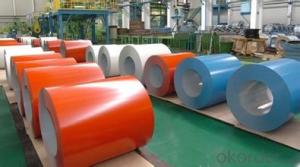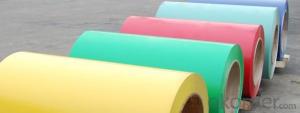Full-coloured aluminum coil
- Loading Port:
- China Main Port
- Payment Terms:
- TT OR LC
- Min Order Qty:
- -
- Supply Capability:
- -
OKorder Service Pledge
OKorder Financial Service
You Might Also Like
Aluminium is a relatively soft, durable, lightweight, ductileand malleablemetalwith appearance ranging from silvery to dull gray, depending on the surfaceroughness. It is nonmagnetic and does not easily ignite. A fresh film ofaluminium serves as a good reflector (approximately 92%) of visible lightand an excellent reflector (as much as 98%) of medium and far infraredradiation. The yield strength of pure aluminium is 7–11 MPa,while aluminium alloys have yield strengths ranging from200 MPa to 600 MPa. Aluminium has about one-third the densityand stiffness of steel. It is easily machined,cast, drawn and extruded.
Aluminium alloys (or aluminum alloys; see spellingdifferences) are alloysin which aluminium(Al) is the predominant metal. The typical alloying elements are copper, magnesium,manganese,silicon,tin and zinc. There are twoprincipal classifications, namely casting alloys and wrought alloys, both of which are furthersubdivided into the categories heat-treatableand non-heat-treatable. About 85% of aluminium is used for wrought products,for example rolled plate, foils and extrusions.Cast aluminium alloys yield cost-effective products due to the low meltingpoint, although they generally have lower tensile strengthsthan wrought alloys. The most important cast aluminium alloy system is Al–Si,where the high levels of silicon (4.0–13%) contribute to give good castingcharacteristics. Aluminium alloys are widely used in engineering structures andcomponents where light weight or corrosion resistance is required
Specification:
Alloy: AA1050, 1060, 1100,AA3003, 3005, 3015, 5052, 5754, 5083,8011, etc
Temper: H14/16/18/22/24/32,HO etc.
Thickness: 0.2mm—100mm
Width: 100mm—2300mm (Can be slitted)
Inner Diameter:508MM
Coil Weight:500kg-3000kg(Max.)
Application:Foil stock, Circles, Roofing, Can stock, Marine plate,Anti-slipery purpose in vehicles, packing and appliance.
Features:
1. Excellent quality of products
2. Quick delivery
3. Best service to clients
4. BV,SGS avalible
5. No buckle o waveness
6. Tension leveling
7. Certificate of Origin
8. Form A,E
Packaging Detail:
Carton ,Woodenpallet with plastic protection packing ,standard seaworthy packing or as yourrequest.
Production Capacity:
AnnualProduction capacity of 600,000 tons.
Products areexported to United States, Canada, U.A.E, Brazil, Mexico,Thailand, Vietnam,Nigeria etc, over 100 countries andregions all over the world.
Production Line:
CNBM aluminumproduction base is comprised of 18 aluminumannealers, 10 coil and foilmills, 4 continuous production lines, 2hot rolling production line and 3prepainted lines.
FAQ:
1. What is the form of payment?
Normally 30% TT, L/C
2. Type of quotation?
FOB, CFR, CIF
3. Port of loading?
Shanghai port
4. Delivery time?
30 days after client’s deposit
- Q:What are the different sizes and dimensions of aluminum coils available?
- The sizes and dimensions of aluminum coils vary depending on the manufacturer and specific application. However, common sizes range from 0.2mm to 6mm in thickness and 100mm to 2000mm in width. Lengths can vary as well, typically ranging from a few meters to several hundred meters. These dimensions can be customized to meet specific project requirements.
- Q:I heard that clay pots and aluminum cans are great caves for my fish to breed in but will the can rust???
- Aluminum okorder /
- Q:Can aluminum coils be insulated?
- Indeed, insulation can be applied to aluminum coils. It is a widespread practice to enhance energy efficiency and avoid heat loss or gain. Usually, the insulation material envelops the aluminum coil, creating a safeguarding coating that minimizes thermal transfer. This insulation method contributes to preserving the desired temperature within the coil and averting detrimental condensation. Moreover, insulation additionally enhances the overall functionality and durability of the aluminum coil system.
- Q:How are aluminum coils protected against mechanical damage?
- Aluminum coils are protected against mechanical damage through several methods. One of the primary ways is by applying a protective coating or finish to the surface of the coil. This coating acts as a barrier between the coil and any potential sources of mechanical damage, such as impact or abrasion. The coating can be a paint or a specialized coating designed specifically for aluminum, which provides enhanced durability and resistance to scratching or denting. In addition to the protective coating, aluminum coils may also be reinforced with a layer of laminate or film. This additional layer adds an extra level of protection against mechanical damage and can help prevent dents or scratches from occurring. The laminate or film can be applied during the manufacturing process or added as a separate step after the coil has been produced. Furthermore, aluminum coils may be wrapped or packaged in protective materials such as plastic or foam to minimize the risk of mechanical damage during transportation or storage. These protective wrappings help cushion the coil and provide a barrier against impacts or heavy objects that could potentially cause damage. Overall, the combination of protective coatings, laminates, and packaging materials helps to ensure that aluminum coils are adequately protected against mechanical damage. These measures help to maintain the integrity and quality of the coils, allowing them to perform effectively in various applications.
- Q:I am so confused right know. I want to cook something using an aluminium foil. Is the reflective side supposed to be inside or outside?
- not usually too big a deal either way really, but make absolutely sure you NEVER use it in a microwave as bill suggested!!!
- Q:Can aluminum coils be used for pharmaceutical packaging?
- Certainly, pharmaceutical packaging can make use of aluminum coils. Aluminum is widely preferred for such purposes owing to its numerous advantageous properties. Notably, its lightweight nature, resistance to corrosion, and exceptional barrier properties render it exceptionally suitable for safeguarding pharmaceutical items against external elements like moisture, oxygen, and light. Moreover, aluminum coils can be conveniently fashioned into various shapes and sizes, thereby offering flexibility to meet diverse packaging requirements. It is also worth mentioning that aluminum is both non-toxic and non-reactive, thereby guaranteeing the safety and overall quality of pharmaceutical products.
- Q:What are the common sizes of aluminum coils used in roofing?
- The common sizes of aluminum coils used in roofing can vary depending on the specific needs and requirements of the project. However, some popular sizes include 24-inch, 36-inch, and 48-inch widths. These sizes are often chosen for their compatibility with standard roofing systems and their ability to cover a wide surface area efficiently. Additionally, the thickness of the aluminum coil can also vary, with common options ranging from 0.019 inches to 0.032 inches. Ultimately, the size of the aluminum coil used in roofing will depend on factors such as the size of the roof, the desired aesthetic, and the local building codes and regulations.
- Q:Can aluminum coils be used in the production of fire-resistant structures?
- Yes, aluminum coils can be used in the production of fire-resistant structures. Aluminum is naturally fire-resistant and has a high melting point, making it an ideal material for structures that need to withstand high temperatures. Aluminum coils are commonly used in the construction industry for fire-resistant applications such as roofs, walls, and insulation. Additionally, aluminum is lightweight and durable, making it easier to install and maintain in fire-resistant structures.
- Q:Who knows Xingtai aluminum shutter door how much is one square meter?
- Two floor is right, you have to use a thick price on the high. A good job, 2012 way, is dead, and get a color to cope with it, ha ha.
- Q:How are aluminum coils used in the production of cookware?
- Aluminum coils play a crucial role in the production of cookware due to their unique properties and versatility. These coils are used as the primary material in the manufacturing process of various types of cookware, including pots, pans, and baking sheets. Firstly, aluminum coils are known for their excellent heat conductivity, which allows for efficient and even heat distribution throughout the cookware. This property ensures that food is cooked evenly and reduces the chances of hot spots or uneven cooking. This is particularly important for achieving optimal cooking results and preventing food from burning or sticking to the cookware. Secondly, aluminum coils are lightweight yet durable, making them ideal for cookware production. The lightweight nature of aluminum ensures that the cookware is easy to handle and maneuver while cooking, reducing the risk of accidents or injuries. Additionally, aluminum's durability ensures that the cookware can withstand high temperatures, constant use, and the rigors of everyday cooking without warping or deforming. Furthermore, aluminum coils are highly resistant to corrosion and rust, making them suitable for cookware that comes into contact with food and liquids. This property ensures that the cookware remains hygienic and safe for cooking purposes, as aluminum does not react with acidic or alkaline ingredients commonly used in cooking. Moreover, aluminum coils are malleable and can be shaped into various cookware designs, including pots, pans, and bakeware with different sizes, shapes, and depths. This flexibility allows for the production of cookware that caters to different cooking techniques and preferences. In terms of production, aluminum coils are typically subjected to a series of manufacturing processes, such as rolling, annealing, and stamping, to transform them into the desired cookware shape. These processes ensure the final cookware product meets the required specifications in terms of thickness, strength, and appearance. In conclusion, aluminum coils are essential in the production of cookware due to their excellent heat conductivity, lightweight yet durable nature, resistance to corrosion, and malleability. These properties enable the creation of high-quality cookware that provides efficient and even cooking results, durability, and ease of use. Overall, aluminum coils contribute significantly to the functionality and performance of cookware, making them a popular choice in the industry.
1. Manufacturer Overview |
|
|---|---|
| Location | |
| Year Established | |
| Annual Output Value | |
| Main Markets | |
| Company Certifications | |
2. Manufacturer Certificates |
|
|---|---|
| a) Certification Name | |
| Range | |
| Reference | |
| Validity Period | |
3. Manufacturer Capability |
|
|---|---|
| a)Trade Capacity | |
| Nearest Port | |
| Export Percentage | |
| No.of Employees in Trade Department | |
| Language Spoken: | |
| b)Factory Information | |
| Factory Size: | |
| No. of Production Lines | |
| Contract Manufacturing | |
| Product Price Range | |
Send your message to us
Full-coloured aluminum coil
- Loading Port:
- China Main Port
- Payment Terms:
- TT OR LC
- Min Order Qty:
- -
- Supply Capability:
- -
OKorder Service Pledge
OKorder Financial Service
Similar products
New products
Hot products
Hot Searches
Related keywords





























